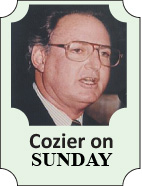Michael Muirhead said all the right things on his appointment last week as new Chief Executive Officer of the West Indies Cricket Board (WICB), a post he takes up in nine days time.
The 55-year-old Jamaican management consultant declared that he stands “committed to advancing the implementation of the Strategic Plan and the policies of the Board” and pledged that he would “do my utmost to maintain and improve on what has already been put in place thus ensuring that we as West Indians can once again proudly hold our heads high.”
 These are expected goals but complex all the same for someone whose departing predecessor described his three years in the job as “incredibly difficult, stressful and strained” and the three before him who all left before their time.
These are expected goals but complex all the same for someone whose departing predecessor described his three years in the job as “incredibly difficult, stressful and strained” and the three before him who all left before their time.
Muirhead will hardly have time to organize his desk in St. John’s before he is confronted by the grim realities of West Indies cricket administration, more precisely its interminable battles with the West Indies Players Association (WIPA).
Within three weeks, the injunction granted to the WIPA by the arbiter in relation to the Memorandum of Understanding (MoM)/Central Bargaining Agreement (CBA) between the parties goes back to court in Port-of-Spain for final determination.
The WICB’s contention is that the contract, in existence since 2005, should be renegotiated; the WIPA disagrees.
Ernest Hilaire, the outgoing CEO who takes up the less stressful and strained posting as St. Lucia’s High Commissioner to London, maintained that “the way the MOU/CBA is written it causes too many conflicts in terms of the ambiguity of the language, in terms of the lack of clarity of some of the provisions.
“It was not intended to remain unchanged in perpetuity,” he stated, adding that as long as it remains as its present from “it will always be an issue” with the WIPA.
The assistance of the Inter-national Cricket Council (ICC) and the Federation of International Cricketers Association (FICA) had been sought to try to reach a settlement but it came to nothing, leading to the latest need for arbitration and the subsequent injunction.
The WIPA has a 14-0 record in such matters over the years so it was staggering to hear Hilaire claim during his lengthy going-away interview with Simon Crosskill on Sportsmax last week that the WIPA had told the joint meeting with the Caricom cricket sub-committee in early September that if it happened to lose this one it would “shut down” cricket. In another words, yet another strike.
Wavell Hinds, WIPA’s acting president and CEO since Dinanath Ramnarine retired in March, was in his regular position as Crosskill’s partner on the Sportsmax show. He did not refute Hilaire’s allegation.
It seemed significant that Ramnarine, the WICB’s assertive nemesis throughout his nine years as WIPA head, had resurfaced to join Hinds at the Caricom meeting.
It might well have been, as they say in Trinidad, a “grand charge”. Perhaps it was a meant to serve notice on the new chief executive that the WIPA hasn’t been weakened by Ramnarine’s move from inside to outside the ring and still packs a punch. Whatever, it was an ominous threat. Hilaire claimed, on the same programme, that several players had written to the WICB advising against diverting a percentage of their fees to the WIPA because they were dissatisfied with the direction it was going. Hinds did not comment.
The former CEO also referred to the Mom/CBA provision that states that both parties should agree to venues for regional and international matches. It is a clause properly meant to ensure that players are provided with suitable facilities and playing conditions.
As the WICB stated following its meeting in Barbados last weekend, while it approved an updated draft schedule for cricket in 2012-13 and the fixtures committee recommendations for host venues for the Caribbean T20 in January, both have to be approved by the WIPA.
On this score, Hilaire revealed that the WIPA did not agree to the staging of the two T20 Internationals against New Zealand in Fort Lauderdale, Florida in July. The WICB went ahead and scheduled them all the same; the WIPA did not pursue the matter but Hilaire’s point was that they had the right to as they do in any similar case.
As soon as the Mom/CBA injunction case in done with, another with more serious financial and long-term implications comes to its conclusion in the Trinidad and Tobago High Court.
In August, 2011, the WIPA lodged a lawsuit claiming US$20 million in damages for itself and its members for restraint of trade over the WICB’s refusal to grant an unconditional No Objection Certificate (NOC) to Chris Gayle, a player not under contract, that would free him to join whichever team he chooses.
The WIPA announced its move in language at its most combative. The WICB, it charged, was “engaged in a malicious, wanton and willful campaign to breach the express and implied terms of the Collective Bargaining Agreements (CBA) …as well as imposed unlawful and unreasonable restraints of trade on West Indies cricketers.”
The legal teams for both sides have spent over a year diligently preparing their submissions. It is already an extremely costly exercise, guaranteed to get costlier and messier. Other boards will take a keen interest in the outcome for it will affect the game globally.
In the interim, there is the demand from Senior Counsel Seenath Jairam for an apology following Hilaire’s comments that his favourable arbitration in favour of Ramnaresh Sarwan, who was awarded US$166,000, was flawed and the still unsettled matter of the administration of the game in Guyana.
The new chief executive certainly won’t be able to look forward to a peaceful honeymoon introduction.




